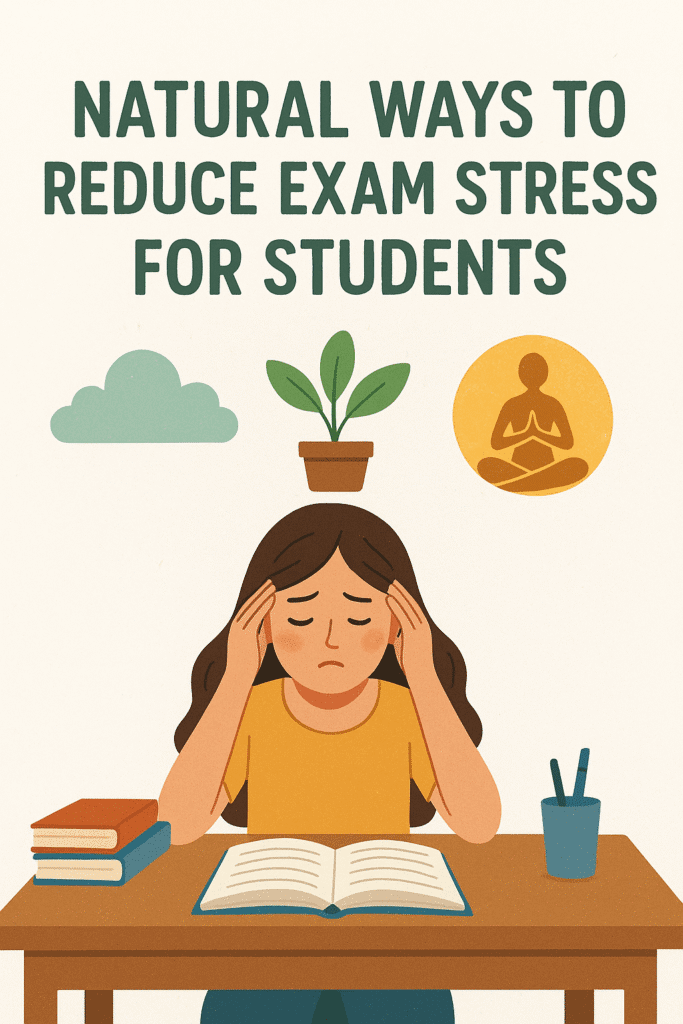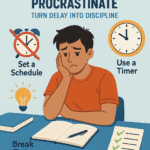Natural Ways to Reduce Exam Stress for Students
“You can’t calm the storm, but you can calm yourself. And the storm will pass.”
Exams have a strange power—they make even the calmest students anxious. Late-night study sessions, sleepless nights, endless cups of coffee, and that racing heart before opening the question paper… we’ve all been there.
But what if we told you that managing exam stress isn’t about working harder—it’s about working smarter and living calmer?
You don’t need energy drinks or last-minute cramming; you need a clear mind, a balanced body, and healthy habits that help you stay centered.
Here are some natural ways to reduce exam stress for students—methods that nourish your mind, body, and emotions during the most demanding time of the year.
1. Breathe Before You Begin
It sounds simple, yet it’s the most powerful. Deep breathing signals your brain that you are safe. It reduces cortisol (the stress hormone) and increases oxygen flow, improving focus.
Try This:
-
Sit comfortably and close your eyes.
-
Inhale slowly for 4 seconds.
-
Hold for 4 seconds.
-
Exhale gently for 6 seconds.
Repeat for 5–10 rounds before studying or during exam breaks.
Tip: This “4-4-6” breathing technique instantly calms your nerves and clears your mind before an exam.
2. Eat Light, Eat Right
Food has a direct connection with your brain chemistry. Heavy or processed food makes you sluggish, while nutrient-rich meals boost concentration.
Ideal Exam Diet:
-
Breakfast: Oats, fruits, or boiled eggs for slow energy release.
-
Lunch: Brown rice, dal, and vegetables.
-
Snacks: Nuts, dark chocolate, or yogurt.
-
Dinner: Light and early.
Avoid: Too much caffeine, sugary drinks, or instant noodles. They give energy spikes followed by sudden crashes.
3. Sleep is a Superpower
Pulling all-nighters may feel productive, but your brain performs worse when sleep-deprived.
During sleep, your mind processes what you studied—without it, retention drops.
Sleep Routine for Exam Days:
-
Sleep at least 6–8 hours daily.
-
Avoid screens 30 minutes before bed.
-
Keep your study table and bed separate.
Remember: A fresh mind solves questions faster than a tired one.
4. Create a Study Routine That Works for You
Stress multiplies when your study schedule is unrealistic. Instead of copying others, design a rhythm that fits your life.
Try the “50-10 Rule”:
-
Study for 50 minutes → Take a 10-minute break.
-
After 4 sessions, take a longer break (30–45 mins).
This approach keeps your focus high and prevents burnout.
Bonus Tip: Prioritize difficult subjects in the morning when your mind is fresh.
5. Move Your Body to Relax Your Mind
Physical activity isn’t just good for the body—it’s therapy for the mind. Exercise releases endorphins, your body’s natural mood lifters.
Quick Fixes:
-
Stretch or walk for 15 minutes after study sessions.
-
Practice yoga or light jogging in the morning.
-
Even a few push-ups or dancing to your favorite song helps!
Fact: Regular movement improves blood flow to the brain, sharpening memory and problem-solving ability.
6. Practice Mindfulness or Meditation
Mindfulness is not about emptying your mind—it’s about noticing your thoughts without judgment. During exams, our mind often jumps between fear and doubt. Mindfulness brings it back to the now.
Simple Method:
-
Sit quietly and observe your breathing.
-
If your mind wanders, gently bring it back to your breath.
-
Do this for 5 minutes daily.
Tip: Guided meditations (available free on YouTube or Spotify) can help you start easily.
7. Stay Organized, Stay Relaxed
Clutter creates chaos. A messy study space often leads to a cluttered mind.
Organize Your Study Environment:
-
Keep only what you need on your desk.
-
Make a daily to-do list (maximum 3 tasks).
-
Cross them off once done—it gives a dopamine boost!
Hack: Use highlighters or sticky notes to track progress—it visually motivates your brain.
8. Take Short Mental Breaks
You’re not a machine. Studying for long hours without pause decreases efficiency.
During breaks:
-
Step outside for fresh air.
-
Listen to calming music.
-
Stretch or make yourself a drink.
Science-backed fact: Short breaks increase memory retention by up to 30%.
9. Talk About Your Stress
Bottling emotions increases anxiety. Whether it’s a friend, parent, or mentor—talking about your fears reduces their intensity.
Tip: Share your worries, but focus on solutions. Discuss study techniques, not just stress.
Sometimes, just being heard is enough to feel lighter.
10. Believe in Yourself
Perhaps the most underrated but powerful natural remedy for exam stress is self-belief.
You’ve studied, prepared, and done your best—that’s what matters.
Try This:
Repeat these affirmations daily:
-
“I am calm and focused.”
-
“I trust my preparation.”
-
“I can handle this challenge.”
Confidence transforms nervous energy into determination.
FAQs – Natural Ways to Reduce Exam Stress for Students
1. How to reduce stress and anxiety during exams?
Take deep breaths, sleep properly, eat balanced meals, and study with short breaks. Avoid comparing yourself with others—stay focused on your plan.
2. Exam stress and anxiety
Exam stress happens when pressure and fear take over your thoughts. It’s normal but manageable with breathing exercises, organization, and relaxation techniques.
3. Exam stress symptoms
Common symptoms include headaches, sleeplessness, irritability, stomach pain, lack of focus, and racing thoughts. Listen to your body’s signals and take breaks.
4. How to deal with exam stress essay
Start your essay by defining exam stress, explain its causes (pressure, fear, workload), and share natural solutions like meditation, exercise, and sleep. End with a message of self-belief.
5. How to deal with exam stress essay (for students)
Structure your essay into three parts:
-
Introduction: What exam stress is.
-
Body: Causes and coping methods.
-
Conclusion: Lessons learned and motivation for students.
Conclusion
Exam stress is not your enemy—it’s your body’s way of saying, “I care about this.”
But to perform your best, you must balance that stress with calm.
Eat well, breathe deeply, rest fully, and trust yourself. The marks will follow, but peace of mind will stay with you forever.
“The goal is not to eliminate stress, but to manage it gracefully.”
When you learn that, exams stop being battles—and become opportunities to shine.
Also Read – How to Balance Life After a Breakup – Healing, Growth, and New Beginnings



